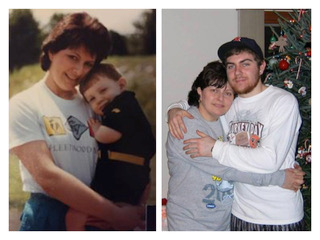
Peer Grief Helper Profile: Kathy Leonard
By Kerry J. Bickford, VOICES Editor
On December 16, 2014, Kathy Leonard and Jonathan Testa, her only child, were having a heart to heart talk about addiction and their seven-year journey together through the ups and downs of recovery. Jonathan was lamenting the time he had lost and feeling overwhelmed about how to put it behind him. Kathy, on the other hand, was feeling a calling and told him she did not want to see another parent or child go through what they had.
“I want to help in some way,” she told him.
“Mom, I think you’d be really good at that” was his response.
Twenty four hours later, he was gone.
Six years later, Kathy recalled the early years of Jonathan's journey through addiction and how lonely they were.
The first time he was arrested for selling cocaine, she said, “I felt so alone, so embarrassed. I didn’t know anyone else who had been through this and I felt the stigma. If I knew then what I know now, I don’t know if things would have been different.”
It’s a question we all ask ourselves -- those of us who have lost loved ones to overdose.
Was there something we could have or should have done? How could we have prevented this? Is there something I didn’t know that would have made a difference?
These are the questions that Kathy asked herself over and over, and this is what propelled her into a peer support role -- both in grief and addiction -- a role that has been transformational for her and for those around her. Her passion is ignited by the memory of Jonathan's own struggle and what he referred to as “tears over lost time."
Jonathan’s story is one more heartbreaker. This is a young man who was the light of his mother’s life -- an honors student, a talented athlete and a gifted musician. He began playing guitar in elementary school and moved on to trumpet, winds, drums, jazz, marching band -- eventually settling into percussion. He attended one year at UMass Lowell as a music major, but seemed different when he came home. He was arrested not long after beginning his second year -- and he “lied, borrowed and stole” from those around him to maintain his habit for the next two years. He served time in jail, but when he came home, he immediately began using again -- falling into an “in and out” pattern where he would serve time or go into treatment, and immediately pick up after returning home. There were no efforts to help him reintegrate, and this shy, artistic, gifted musician was being eaten alive by the disease of addiction. He could no longer bear looking at the time he had wasted, and this is how he was feeling a week before Christmas 2014, while discussing holiday plans with his worried mother.
“Mom, you need to stop worrying and live your life,” said Jonathan.
But late the following night her fears were realized when the phone rang with the news that her only son had overdosed and died in his sober home.
Kathy sadly recalled the long line at Jonathan’s wake and how surprised he would have been that he had so many friends who still cared about him. Addiction is a disease of great isolation and loneliness, and Jonathan felt this deeply. Kathy felt it, too, and she wasted no time before becoming involved in a host of local events, beginning with a candlelight vigil for overdose awareness victims in her community just a few months later. She was determined to prevent others from going it alone.
She also started facilitating a grief support group for people bereaved by an overdose death . She shared (and continues to share) her experience by speaking at churches, schools and prisons and eventually becoming chair of the Marlboro Alliance for Prevention. She currently co-facilitates One Step at a Time in Marlboro and exemplifies support in a “stigma-free zone.” As she put it, “this is not where I saw myself at age 60, “but it’s so rewarding -- a painful blessing.”
It is a humbling experience to witness someone's journey through tragedy and see such a powerful outcome. She is truly an inspiration.
We talked -- mother to mother -- about how living through a child's struggle with substances almost ordains us as “mentor moms”; and that calling is what keeps us deeply connected to the child we knew and loved -- and continue to love. We can see past the disease and feel passionate about helping others to reclaim their children as the beloved and precious people we still carry in our hearts. This is at the core of every peer grief helper’s being -- and SADOD embraces this compassionate and caring community of hope and treasures those, like Kathy, who continue to bring comfort to others in the darkest hours of our grief.
